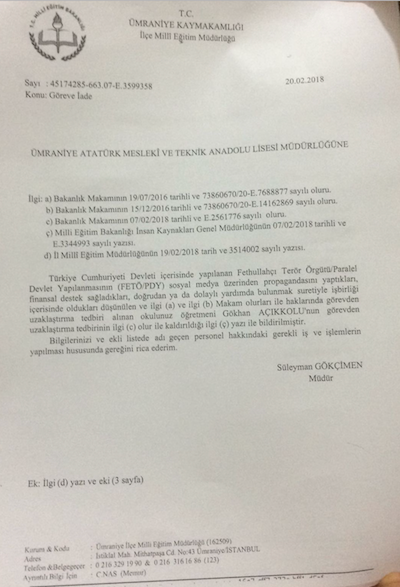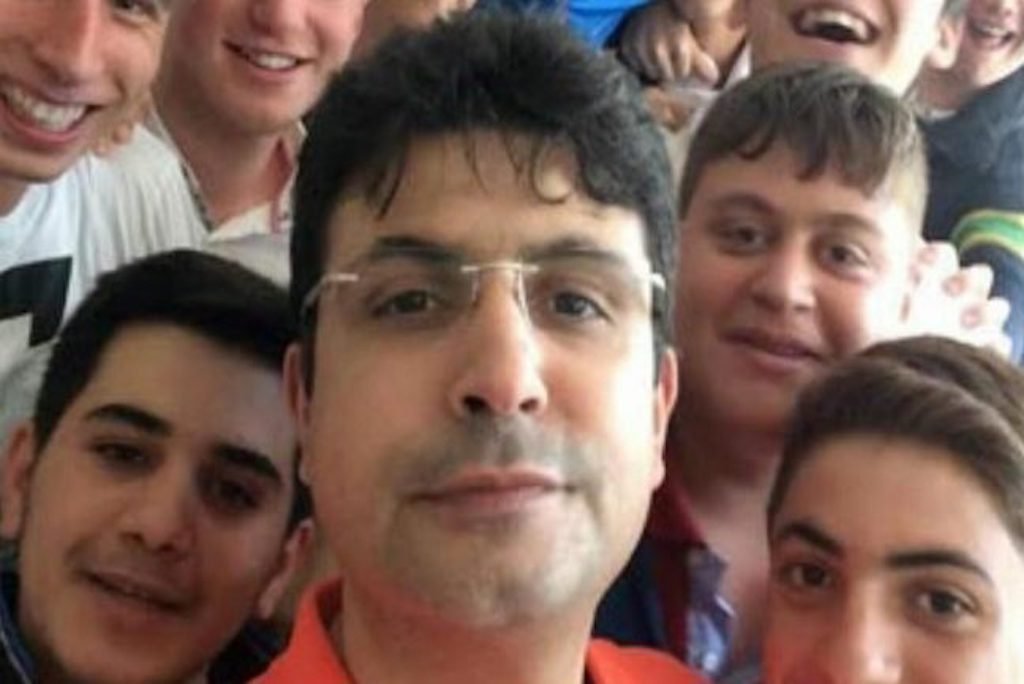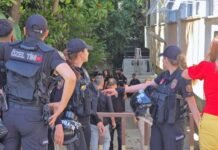Forty-two-year-old Turkish teacher Gökhan Açıkkollu, who was tortured to death under police custody in the wake of a controversial military coup attempt on July 15, 2016 over alleged links to the Gülen movement, would be acquitted from the charge of alleged involvement in the coup attempt if he had survived.
Açıkkollu was detained on July 24, 2016 on trumped-up charges of coup plotting and terrorism and remained in police custody for 13 days, during which time he was subjected to both physical and psychological torture. He was never officially interrogated, and the police did not even take a statement from him. Instead, he was taken from his cell every day to face torture and rushed to the hospital when his condition deteriorated, only to be sent back to detention. He told doctors about the abuse and torture; yet, in some cases his statements were not even registered in the medical reports, and evidence of physical abuse was covered up under pressure from the police.
Açıkkollu was beaten, slapped in the face, kicked in the rib cage, kneed in the back and his head banged against the wall. His medical check-up before he was put in detention showed no signs of any heart troubles; yet, he was pronounced dead due to heart failure. When he collapsed in his cell, emergency services were belatedly called and he died in detention, although official records were doctored to reflect the false fact that he died at the hospital.
Prof. Dr. Şebnem Korur Fincancı, president of the Human Rights Foundation of Turkey (TİHV), emphasised in a report that Açıkkollu died of a heart attack on August 5, 2016 due to the torture he was exposed to in detention.
His family had found out about his death when they were called to the İstanbul Institute of Forensic Medicine. The ill treatment of Açıkkollu continued here as well. They were told that the funeral could be held on condition that he was buried in “a graveyard of traitors,” prepared by the Greater İstanbul Municipality for alleged “traitors,” despite the fact that he had not been tried nor even interrogated. Imams assigned by the Turkish Religious Affairs Directorate (Diyanet) refused to say a funeral prayer for Açıkkollu.
His family had to embalm the body themselves and was obliged to take him to his hometown in the Ahırlı district of Konya province in their own vehicle. Here too, the imam of the local mosque would not perform the funeral prayer because of instructions from the Religious Affairs Directorate that “the funeral prayer will not be said for traitors.” So the last rites was also performed by his close relatives.
Habib Ertürk, who was alleged to be the informant who accused Açıkkollu, reportedly withdrew the statements he made in detention and before the court. Ertürk told the court that the accusations against Açıkkollu were fabricated by the police and that he was obliged to sign these fabricated statements under duress.
However, the prosecutor’s office had accused Açıkkollu of directing and dispatching the allegedly putschist police officers to the Bosporus Bridge despite the absence of any evidence. Since Açıkkolu died from torture while in detention the case against him was
The people who were allegedly connected to Açıkkollu have been tried and the court has acquitted all the defendants, including the police officers, from the charge of taking part in the coup attempt on July 15, 2016. The court has only sentenced the related defendants in the case over their alleged links to the Gülen movement. Therefore, if Açıkkollu were still alive today, he would probably have been acquitted of the groundless charge of involvement in the coup attempt.

The reinstatement decision, numbered E.2561776, for Açıkkolu was rendered by the Turkish Education Ministry on Feb. 7, 2018. The official document for Açıkkolu’s reinstatement was delivered by the principal of the school he used to work for to Açıkkollu’s teacher wife, who had also been dismissed from her job by a government decree under the state of emergency declared in the aftermath of the coup attempt. Thus, the honour of the late Gökhan Açıkkollu was restored by saying a simple “pardon” one-and-a half years after his death.
In a report titled “Tortured to Death” SCF investigators on Nov. 21, 2017 exposed the case of 42-year-old history teacher Gökhan Açıkkollu, who died after enduring 13 days of torture and abuse in police detention in İstanbul.
The torture, ill-treatment, abusive, inhuman and degrading treatment of people who are deprived of their liberties in Turkey’s detention centers and prisons have become the norm rather than the exception under increased nationalistic euphoria and religious zealotry in the country in the wake of the controversial coup attempt on July 15, 2016.
The Stockholm Center for Freedom (SCF) reported in one of its studies titled “Suspicious Deaths and Suicides In Turkey” that there has been an increase in the number of suspicious deaths in Turkey, most in Turkish jails and detention centers where torture and ill-treatment are being practiced. In most cases, authorities concluded these to have been suicides without any effective, independent investigation.
Suspicious deaths have also taken place beyond the prison walls amid psychological pressure and threats of imminent imprisonment and torture, sometimes following the release of suspects or just before their detention. SCF has compiled 120 cases of suspicious death and suicides in Turkey in a list as of July 24, 2018 in a searchable database format.
Hundreds of thousands of people in Turkey have been the subject of legal proceedings in the last two years on charges of membership in the Gülen movement since the coup attempt in July 2016, a Turkish Justice Ministry official told a symposium on July 19, 2018.
“Legal proceedings have been carried out against 445,000 members of this organisation,” Turkey’s pro-government Islamist news agency İLKHA quoted Turkish Justice Ministry Deputy Undersecretary Ömer Faruk Aydıner as saying.
Turkey survived a controversial military coup attempt on July 15, 2016 that killed 249 people. Immediately after the putsch, the Justice and Development Party (AKP) government along with President Recep Tayyip Erdoğan pinned the blame on the Gülen movement.
Fethullah Gülen, who inspired the movement, strongly denied having any role in the failed coup and called for an international investigation into it, but President Erdoğan — calling the coup attempt “a gift from God” — and the government initiated a widespread purge aimed at cleansing sympathizers of the movement from within state institutions, dehumanizing its popular figures and putting them in custody.
Turkey has suspended or dismissed more than 150,000 judges, teachers, police and civil servants since July 15. On December 13, 2017 the Justice Ministry announced that 169,013 people have been the subject of legal proceedings on coup charges since the failed coup.
Turkish Interior Minister Süleyman Soylu announced on April 18, 2018 that the Turkish government had jailed 77,081 people between July 15, 2016 and April 11, 2018 over alleged links to the Gülen movement.
Even the report on Açıkkollu’s tragic death was not tolerated
The AKP government led by President Erdoğan and the pro-government media could not even tolerate the journalists who covered Açıkkollu’s tragedy. Açıkkolu had been labeled and lynched as a traitor despite the lack of any evidence. The crime of torture targeting Açıkkollu had thus been ignored, and the media approached the issue as if he deserved to be killed by torture.

Exiled journalist Bülent Ceyhan, who reported on Açıkkollu’s death based on health reports and eyewitness statements, has received his share of this lynching campaign after he was awarded the Metin Göktepe Prize for his report on Açıkkollu’s death.
The award was instituted by the Evrensel daily 21 years ago in memory of journalist Metin Göktepe, who was killed by torture under police custody. The jury for the 21st Metin Göktepe Awards, which was composed of 14 journalists, decided to bestow the award for Ceyhan’s report titled “The Documents of the Murder of Gökhan Açıkkollu,” which was published by online news outlet TR724 on March 31, 2018. The decision was announced and covered in the media.
However, the pro-government Yeni Şafak daily published a report on the jury’s decision on April 2, 2018 under the headline “Award bestowed on FETÖ journalist.”
The neo-nationalist online news outlet Odatv also launched a smear campaign against Ceyhan, who was labelled “a member of a terrorist organisation” in an article by Barış Pehlivan titled “Is the Metin Göktepe award given to Fethullahists?” despite the lack of any relevant court decision concerning Ceyhan. Journalist Celal Yıldız threatened journalist Fatih Polat, the editor-in-chief of Evrensel, to withdraw the award to be given to Ceyhan.
The pressure, which was started by Yeni Şafak and Odatv, continued. Hürriyet correspondent Toygun Atilla targeted the members of the jury, saying they were wondering about the award committee. Fatih Yaşlı, a columnist for the Birgün daily, also used fascist expressions. “Metin Göktepe’s name cannot be smeared by giving an award to Fethullahist Gang members. The parties responsible must give an explanation,” he said.
Prof. Dr. Şebnem Korur Fincancı, a forensic medicine expert and president of the Human Rights Foundation of Turkey (TİHV), reacted against the defamation campaign and and asked on her personal social media account, “Has torture [in this country] gained legitimacy on the basis of affiliation?”
However, the members of the jury selected by the Evrensel daily hesitated to give the award to Ceyhan. The jury, which consisted of Belma Akçura, Berkant Gültekin, Celal Başlangıç, Çiğdem Toker, Elif Görgü, Erol Önderoğlu, Fikret İlkiz, İnan Kızılkaya, Kamil Tekin Sürek, Kumru Başer, Melis Alphan, Nazan Özcan, Nazım Alpman and Turhan Günay, announced the cancelation of the award, with the result that no journalist in print media was honored with the Metin Göktepe Prize for the first time in 21 years.















